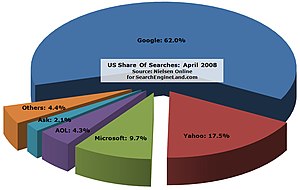Image via CrunchBase
Most people think about search as a simple series of actions: type in a phrase, cross your fingers it brings up what you need, and then click around a page of blue links till you get what you were looking for.
But Stefan Weitz, director of Microsoft‘s search engine Bing, says that we should expect more out of our search experience. He criticizes “traditional” search engines — namely, web giant Google, Bing’s main competitor — for failing to keep up with the changing needs of users by sticking with the the search model they’ve always used, which is based on an algorithm measuring the strength of backlinks.
“When Google launched, they wanted to organize the world’s information, that was their mantra — it still is,” Weitz said in an interview. “It was a great vision that assumed really the web of yore, which is a web of documents, literally pages and the connections. Google’s whole mission was to leverage those connections and say, ‘Okay, I can see that the connection between these two pages is almost as important as the page content itself in defining what these things are about’ — it was a brilliant, brilliant model.”
But what worked ten years ago doesn’t work as well anymore, Weitz said, noting that the amount of information available online today, and the range of activities people seek to do there, have made the simple search that currently exists less effective.
“Search itself hasn’t changed fundamentally in the past 12 years,” he said. “Traditional search is failing. The standard notion of search … looking at the texts in the page, the backlinks, all that stuff doesn’t work
anymore.”
Yet for all the flaws Weitz might find with Google, Bing offers a similar set of features, such as searches keyed to news, images, and maps, as well as the ability to calculate sums, define words, and check the weather. Moreover, Google has maintained its dominance in the search market. It claims 65 percent market share to Bing’s 14 percent — a dominant position that has attracted scrutiny from government regulators, who are investigating whether Google’s search dominance is anti-competitive. Microsoft, itself convicted of antitrust abuses, has supported regulators’ investigation of Google in Europe, and Weitz added that in his estimation, the government probe into Google’s activities is understandable, given Google’s power in the area.
“I think whenever you have a player who has, depending on who you’re looking at, two-thirds of the market, it’s natural for regulators to look into this,” he said. “In Germany they have 98 percent share. It’s natural for folks to just look into what’s going on there. This is a place that controls so many people’s livelihoods, you want to make sure its a level playing field.”
Google has started to include social results in its search in an attempt to make searches more relevant to users. Its new +1 feature lets users “like” results in search and see when friends and other users have “liked” that result as well. But Weitz said he didn’t think the feature was particularly useful.
“+1 today is only on search results,” he said. “I don’t really like search results very often. I like the sites, but I don’t like the result itself. I don’t know how helpful it is, frankly, to like the results.”
Bing is attempting to get a leg up on Google with its own take on social search results. The company recently unveiled a feature that pulls information from Facebook to show what sites, articles and other content Facebook friends have “liked.”
Bing’s approach to social data is to focus on delivering what it believes will characterize search in the future: An engine that anticipates a user’s needs and helps make decisions, finding the most relevant information without the user having to put in an undue amount of effort. But whether it will be able to distinguish itself from Google’s efforts to go social remains to be seen.
“Our mission is literally to deliver knowledge by understanding intent. What that implies is that we understand the web as this digital representation of the real world,” Weitz said. “We’ve now mapped almost every single square inch of the planet, we know where buildings are, we know who the people are, we know what tasks people are accomplishing — we are literally creating a semantic model, or a model, for everything in the world.”
Source :- http://www.huffingtonpost.com
Related articles
- Bing head says ‘traditional search’ is dying (news.cnet.com)
- Bing’s Stefan Weitz: A Web of Verbs, Not Nouns! (stonetemple.com)
- Is Traditional Search Passé? (technologizer.com)
- Bing head says ‘traditional search’ is dying (news.cnet.com)
- Bing Increases Facebook Integration to Outsocial Google (wired.com)
- Bing Gets Friendlier with Facebook (technologyreview.in)
- Bing Makes Facebook Data To Use, Personalized Bing Results By Facebook (seroundtable.com)
- Bing’s Social Search Won’t Always Rely On Facebook “Likes” (fastcompany.com)
- Why Bing Could Beat Google in Social Search (readwriteweb.com)
- Bing Taps Facebook Data for Fight With Google (bits.blogs.nytimes.com)

 Screenshot courtesy of TwitPic, chanian
Screenshot courtesy of TwitPic, chanian
